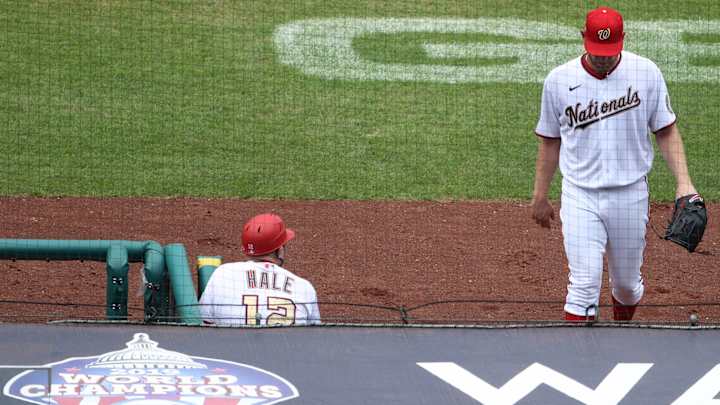What if the Dodgers Had Signed Stephen Strasburg?

On Saturday, the Washington Nationals placed pitcher Stephen Strasburg on the 10-day injured list with carpal tunnel neuritis in his throwing hand. Strasburg left Friday's start after throwing just 16 pitches, shaking his hand due to apparent irritation.
If you've experienced carpal tunnel syndrome, you know that typically comes with pain, numbness or weakness in the hand and wrist, sometimes going up the forearm.
Losing Strasburg for an indefinite amount of time is a significant blow to the Nationals and any chance at repeating as World Series champions. But this is a site about the Dodgers, right? What does this have to do with them?
Well, the Dodgers showed interest in signing Strasburg as a free agent last December. The team was looking to add an elite starting pitcher to its rotation, and Strasburg was coming off an excellent postseason during which he compiled 47 strikeouts in 36 1/3 innings and a 1.98 ERA.
Strasburg ended up re-signing with the Nats, inking a seven-year, $245 million deal. Perhaps he never intended to leave D.C., but what if the Dodgers had made the proverbial offer that couldn't be refused?
Obviously, teaming Strasburg with Clayton Kershaw and Walker Buehler would've created an overpowering top-three in the Dodgers' rotation. But pitching hasn't been a problem for the Dodgers thus far in 2020, despite David Price opting out for the season and Kershaw suffering an early injury. The staff has a 2.49 ERA overall and starters have compiled a 3.35 ERA.
But would the Dodgers have been able to trade for Mookie Betts (and Price) had they agreed to pay Strasburg $35 million or more per season?
Prior to joining the Dodgers, Betts agreed to a $27 million salary to avoid arbitration for 2020. (Price was set for a $32 million salary. Both of these figures, of course, were before salaries were prorated for a shortened 60-game season.) Those two salaries helped put the Dodgers' payroll at roughly $220 million, $12 million over the luxury (or competitive balance) tax threshold.
Had the Dodgers opted for Strasburg's $35 million (more or less, depending on the length of the contract) instead of the combined $52 million for Betts and Price, the team's payroll would've come in under the luxury tax threshold at $196 million.
Yet those moves wouldn't have occurred in a vacuum either. The team had nine players eligible for arbitration, including Cody Bellinger coming off an NL MVP season, Corey Seager, Joc Pederson and Ross Stripling.
Would Peterson and/or Stripling have had to be traded to clear payroll room for Strasburg (and if fact, they were)? The lineup would've been weakened, along with depth for either the starting rotation or the bullpen.
Could they have signed Blake Treinen to a one-year, $10 million deal? He's been a key part of the relief corps this season with an 0.96 ERA and 10 strikeouts in 9 1/3 innings.
However, the true loss would've been Betts. Where would the Dodgers' lineup be without him right now? Bellinger is batting .187 with a .545 OPS. Peterson has a .153 average and .570 OPS. Max Muncy is hitting. 179 with a .674 OPS. Justin Turner's .820 OPS is below his usual standard.
Meanwhile, Betts is putting up MVP numbers thus far. Batting .314 with a 1.035 OPS, his eight home runs are tied for second in MLB. He appears more than ready to become the face of the franchise and cement his status as one of baseball's brightest stars.
The assumption can't necessarily be made that Strasburg would've suffered the same injuries had he signed with the Dodgers, but his arm already had that significant workload on it. And his injury history is well-documented. He's pitched only five innings, allowing six runs and eight hits in two 2020 starts. With only two strikeouts.
With those numbers Strasburg would've done little to help the Dodgers, especially through a slow start. With five straight wins and fine all-around play, the team has righted itself, while Strasburg is on the injured list for what will likely be more than 10 days and a significant chunk of a shortened season.
Andrew Friedman had targeted Betts for a trade going back to 2019. So perhaps signing Strasburg would've been a (very expensive) consolation prize or insurance policy.
Yet maybe Friedman didn't try to top the Nationals' contract proposal to Strasburg because he knew the Boston Red Sox essentially had to trade Betts to cut a bloated payroll and had the best resources for a deal, along with the ability to take on whatever salary Boston wanted to shed. (Plus, the Dodgers couldn't let him go to a division rival in the Padres.) L.A.'s president of baseball operations was in the best position and eventually capitalized.
If the Dodgers ever ponder the what-ifs of it all, it's likely with a wipe of the forehead in relief. It's all worked out beautifully.
Ian Casselberry watchdogs sports media for Awful Announcing. He's covered baseball for SB Nation, Yahoo Sports and MLive, and was one of Bleacher Report's first lead MLB writers. Please follow Ian on Twitter @iancass and give him a listen at The Podcass.
